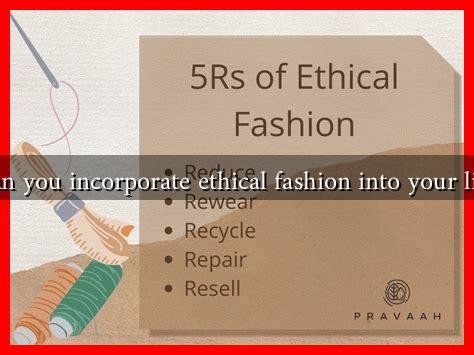-
Table of Contents
How Can You Incorporate Ethical Fashion into Your Lifestyle?
In recent years, the fashion industry has faced increasing scrutiny over its environmental impact and labor practices. As consumers become more aware of these issues, the concept of ethical fashion has gained traction. Ethical fashion refers to clothing that is produced in a way that is environmentally sustainable and socially responsible. Incorporating ethical fashion into your lifestyle not only helps promote a more sustainable future but also supports fair labor practices. Here’s how you can make a difference.
Understanding Ethical Fashion
Before diving into how to incorporate ethical fashion into your life, it’s essential to understand what it entails. Ethical fashion encompasses various aspects, including:
- Sustainable Materials: Using organic, recycled, or upcycled materials that minimize environmental impact.
- Fair Labor Practices: Ensuring that workers are paid fair wages and work in safe conditions.
- Transparency: Brands that disclose their supply chain and production processes.
- Animal Welfare: Avoiding materials that involve cruelty to animals.
1. Educate Yourself on Brands
The first step in incorporating ethical fashion into your lifestyle is to educate yourself about the brands you support. Research companies to understand their practices and values. Look for certifications such as Fair Trade, GOTS (Global Organic Textile Standard), or B Corp, which indicate a commitment to ethical practices.
For example, brands like Patagonia are known for their commitment to environmental sustainability and fair labor practices. They not only produce high-quality outdoor gear but also engage in activism for environmental causes.
2. Shop Second-Hand
One of the most effective ways to embrace ethical fashion is by shopping second-hand. Thrift stores, consignment shops, and online platforms like thredUP or Poshmark offer a plethora of options while reducing waste. By purchasing pre-owned clothing, you extend the life cycle of garments and decrease the demand for new production.
3. Invest in Quality Over Quantity
Fast fashion encourages consumers to buy cheap, trendy items that quickly go out of style. Instead, focus on investing in high-quality pieces that are timeless and durable. This not only reduces waste but also saves you money in the long run. Look for brands that prioritize craftsmanship and use sustainable materials.
4. Embrace Minimalism
Adopting a minimalist wardrobe can significantly reduce your fashion footprint. Consider the following tips:
- Capsule Wardrobe: Create a capsule wardrobe with versatile pieces that can be mixed and matched.
- Declutter: Regularly assess your wardrobe and donate or sell items you no longer wear.
- Mindful Shopping: Before making a purchase, ask yourself if you truly need the item and how it fits into your overall wardrobe.
5. Support Local and Ethical Brands
Whenever possible, support local artisans and ethical brands. Not only does this help stimulate the local economy, but it also reduces the carbon footprint associated with shipping products globally. Look for local markets or online platforms that feature ethical brands.
6. Advocate for Change
Finally, use your voice to advocate for ethical fashion. Share your knowledge with friends and family, and encourage them to make conscious choices. Engage with brands on social media, asking them about their practices and pushing for transparency.
Conclusion
Incorporating ethical fashion into your lifestyle is a powerful way to contribute to a more sustainable and equitable world. By educating yourself about brands, shopping second-hand, investing in quality, embracing minimalism, supporting local businesses, and advocating for change, you can make a significant impact. Remember, every small action counts, and collectively, we can drive the fashion industry towards a more ethical future.
As consumers, we hold the power to influence the market. By making informed choices, we can support ethical practices and promote a fashion industry that values people and the planet.

